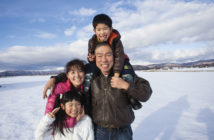Recently celebrating their 30th anniversary, Masa Saito’s BANG BANG has been one of Niseko’s most popular and respected Izakaya establishments, boasting an incredible array of delicious dishes and drinks carefully sourced and prepared by warm and welcoming staff with a traditional flair. We sat down with Saito-san in his cosy alpine office to hear about how his business (and the town that he and his wife made a home in, many decades ago) flourished.
When was the first time you began business in Niseko, and what made you want to build the business here in particular?
I first began business in 1985, in December. Actually I was working in Niseko—like you, at the time, but there was nowhere to go to have a drink—like a bar, or a kitchen like this. So I wanted to create somewhere for me and my friends.
Did you have any experience in running restaurants or bars?
Of course— I didn’t go to culinary school or anything, but kitchen work, the family kitchen—my mother’s kitchen (she was very good), and the influence of my mother played a big part. I worked in different restaurants and hotels, and accommodations, where others would teach me, but I had to learn myself.
Are you from this area originally?
No, I’m from Kyushu.
Did you bring any element of Kyushu to your establishments or did you come here to start something new?
Well, when I originally came here, I came here for the snow— like most people, I’m sure. At the time, I just wanted to spend maybe a month, or two months, but it was so interesting here—the people, and the nature— I love the nature. I felt that I could spend my entire life here, so I decided to buy land, and open my restaurant. I opened this restaurant, not as a business, but because I wanted to live here. I wanted a home.
Where did you get your Izakaya cooking style from?
I learned my style in my friend’s restaurant in Sapporo. He actually taught me in the space of two weeks, as I was building this house—this restaurant.
It was so hard— I could cook, but he gave me the ideas and foundation for this style, and I tried to create something more after that. Thirty years! The restaurant started with him. He’s retired now, and his restaurant closed down over ten years ago, I think, but I keep telling people about it, as it was one of the best experiences in my life—it was such a good thing, and we try to keep in touch all the time.
When I first came to Niseko, there weren’t many restaurants at all. The different pensions and accommodations that were here would all offer their own lunch and dinner, so everyone visiting would just eat in their hotels, and places like that.
After we opened, I noticed that lots of people that worked around here would come to my restaurant to eat and drink, and then the next year, they would bring their guests too! So that’s how we began to get more and more popular.
We all know and appreciate Hokkaido’s famous fresh produce and fertile farmland, but is there anything cultural or spiritual from the area that you want to introduce to people less familiar with the region?
Nothing too special, I wanted to do my own thing, and keep things in their original state—I guess that is the culture here too. Even now, I try to do things the same way I did before, and I’ve done that by keeping things simple.
What do you think has contributed to your popularity?
I believe it’s because I’ve been running the business for so long… It’s been thirty years now…time makes a difference.
(Well not only that—I’m sure the food has something to do with it, too!)
Well, well…maybe.
*Saito-san laughs for a moment.
Well ‘continuing’ is a big thing, it’s our culture, you know? When people start a business, some restaurants are really busy, and some are not. It’s not always just about the taste of the food… it’s often about people. How you live your life and how you’ve lived your past life. I feel that when people come to eat in your restaurant, it’s not a coincidence—they come to see you, to visit you. If you’ve lived a good life, and had positive experiences that have influenced you and the world around you in a good way, people will want to visit you.
Every night, many people come to my restaurant from all over the world. It’s nice. Everyone has their own experiences and their own style, something original just for you, and you should hold onto that.
What did you do before you came to Niseko?
I first started working on ships—merchant and cargo ships mostly—I’ve been to so many places, carrying things from Japan, importing and exporting. I’ve been lucky to have so many adventures. Algeria, England, France…all-over. At that time, over forty years ago, I wanted to explore the world…but in the end it was just visiting—be it a couple of days, or a couple of hours, and I didn’t want that.
So I went to school to learn something different… I was planning on immigrating to Australia, but I found Niseko first, and then there was no need to go to Australia anymore. It’s funny, because many Australians come to me now! For me, it’s interesting to see how things end up.
Lots of locals in the area have different views about tourists and foreigners in Niseko– How has the public perception of them changed in the last thirty years?
When I started my business here, it was around the time of the boom of the domestic ski industry in Japan. Over twenty million people skied in the winter… twenty million. Niseko was always small, but was so crowded back then. Many people took day trips from all over Hokkaido—especially from Sapporo— and would happily wait twenty minutes in queues for the chairlifts, and it seems like it’s getting popular again now. Many foreigners are investing in the area, and that’s bringing in even more foreign tourists as a result.
People can enjoy life anywhere: I think it’s good for me, to see different people, to see things changing—I love it, actually. Many people complain about change happening so quickly, but I just say that life is short, you have to appreciate it. I’m lucky to be here. I’m seeing many different things…many new things, just like when I was younger… I love it.
Niseko has changed a lot, and the surrounding areas have changed with it— lots of new buildings, lots of new people— is there anything that’s changed about your business, or about you personally?
Mostly the business…it’s getting much bigger, but like many places, we’ve noticed issues with being short of staff. It’s a problem everywhere in Japan, I think. We have to think about some sort of solution to find people in the area. Lots of restaurants are having great difficulty with it, and it’s a shame. When you don’t have staff, it’s easy to stop being able to provide great service all of the time, and that’s a big issue.
I can open my restaurant for lunch, and maybe many people will be pleased, and will happily eat there and fill up the seats, but you have to appreciate and look after your staff as well. I can’t push them to work too hard.
It’s difficult to close our doors sometimes— many people come by the restaurant, or telephone, or send me emails complaining that we are not open. But it’s a serious issue— how can you fix this? Maybe by looking overseas for more staff, or even to Kutchan for the young people growing up here, but I think there isn’t a high enough population in Hokkaido… lots of people leave after winter.
We’re open through the summer time, and even though there is less business, I feel that it’s good to keep it going for the staff.
I think better transport links are needed, not just for Niseko but for the whole area too. Throughout the summer and the winter, you can always find shuttlebuses run by the resort or different travel companies and hotels, and that’s quite nice. Back during the boom, many people came to Niseko during the summer—to get away from the heat, and to enjoy the prices and quality of life of Hokkaido—and I think it’s getting very popular again.
Do you still enjoy cooking now?
Actually, I really do, but I can’t afford to cook much anymore. I’m always busy—desk work is the major thing at the moment…bookings…management. I have great regular staff members, and they help me now. If I see them do something different to my style, I do say “this is not right”, and correct it, but now I lead my staff, and that’s my job.
I cook more during the Summer, but in the Winter, it gets very busy—I don’t even have time to ski anymore- there’s no way! But I find it interesting creating something new, and developing menus, things like that.
At the moment, in the evenings in my restaurant my position lets me talk to guests—to each guest actually. Whenever people come to my restaurants I try to spend some time with them—maybe not a long time, but many of my guests are returning people; very good customers who come back year after year. So we know each other, and it is nice finding a connection that we had before, which we can continue.
You must have had a lot of memories and conversations after thirty years!
Right! It’s great—sometimes I forget details, but I always remember faces. Thousands and thousands of people after thirty years. It’s interesting: You’ll have someone who comes alone, then brings friends to drink with, then visits with the girl or boyfriend.
They get married, and the next time you see them they have children; and before you know it, the children are starting to drink too! I like this link with history, this connection with so many different people.
I feel as if this is a big reason why it’s important to do things for a long time—I guess it’s quite cultural, really. It makes me happy, it’s good for the soul and makes me appreciate my life. I don’t know how long I’ll be able to work for, or run this business, but I want to do it for as long as I can, so I can keep meeting people and making connections with them— I love it.




